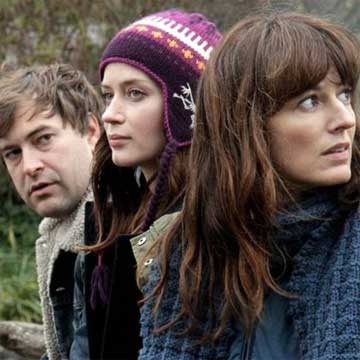Film (2011)
Written and directed by Lynn Shelton
With Emily Blunt (Iris), Mark Duplass (Jack), Rosemarie DeWitt (Hannah)

Schlubs are in, bigtime.
I do not know exactly when their stock started to rise in the romantic comedy genre – though Judd Apatow’s films (Seth Rogen in Apatow’s Knocked Up (2007) is the prototype) seem to have invigorated the genre in which they flourish – but it is, at this point, way up.
This film features Jack (Mark Duplass), an almost good-looking schlub. He’s out of work and obviously depressed. His brother has died – we don’t know why and it doesn’t matter – and he is grieving in his own confused and alienated way. After Jack gives an angry tribute at a year’s anniversary memorial for his brother in Seattle, his brother’s ex-girlfriend, Iris (Emily Blunt), and his closest friend, decides that the best thing for him is to go to her father’s cabin on a somewhat remote island (presumably in Puget Sound) and cool out.
As directed, Jack goes, on bicycle with backpack, and unsuspectingly encounters Hannah (Rosemarie DeWitt), Iris’ half-sister. They spend a little time together throwing back some tequila. The next day, Iris shows up unannounced and the dramatic wheels start to turn.
The elements that provide the tension in this triangular story are not impossible to imagine, but there is enough artifice in what happens to give one pause about the contrived quality of this narrative which tries so hard to seem believable.
The comings and goings early on have enough of a farcical quality to provide fuel for the plot, such as it is. And then the rest of the film rides it out in a slow downhill coast to the sea. The result is a kind of pleasant diversion that seems a little too rapidly wound down and conveniently resolved.
The writing seems to have left a good deal of room (if not completely) for improvisation. My sense was that the large plot structures were put in place and the actors then allowed to do their thing. They are not bad at it, but there is a feeling of it being invented on the spot that pervades much of it. Instead of feeling, however, how spontaneous and natural, I felt oh, this is improvising, not writing. That probably was not the sought-after audience response.
The schlub role seems perfectly suited for providing vulnerable romantic heroes who are just short of realization and, with a little work, capable of being both sensitive and eventually diligent in some way. Here, Mark Duplass is perfect rough-hewn schlub material. With a few less pounds and a little more therapy and employment, he would be a real catch.
It is nice to see Emily Blunt here in an independent film playing a folksy role. Since her splash as the uptight assistant in The Devil Wears Prada (2006) it has been a little hard to see her as anything but efficient, curt and nasty. But here she is warm, down to earth and the perfect semi-schlub’s counterpart.

Courtesy of The Art Institute of Chicago
The film’s ending contains a cliffhanger which never gets resolved. As much as schlubs have become popular in independent comedies, so have these kinds of endings. Like the famously uninformative and ambiguous ending of The Sopranos on TV – which many chalked up as dramatic TV poetry – it is meant to give narrative depth and a sense of dramatic realism. But now the technique is so overused, it has simply become an emblem of pretentiousness and a vehicle for audience frustration.
Nonetheless, this is not an unenjoyable evening at the movies. It is hang-loose, and warm and fuzzy despite its small nod to alienation, and though the resolutions come too quickly and easily, it all goes down pleasantly enough.
– BADMan
Leave a Reply